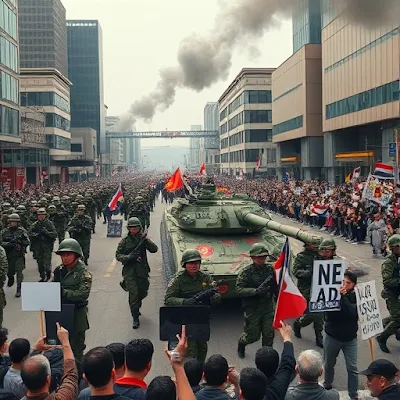South Korea Declares Martial Law in 2024: A Historic Decision Amidst Rising Tensions
On December 3, 2024, South Korean President Yoon Suk-yeol made a shocking and unprecedented move by declaring martial law across the country. This historic decision comes amidst growing political turmoil and heightened tensions between the executive and legislative branches of the government. Yoon's declaration was driven by several factors, including a legislative gridlock, impeachment proceedings against government officials, and the alleged threat posed by opposition factions whom the president accused of undermining South Korea’s constitutional order.
Reasons Behind the Martial Law Declaration
In his announcement, President Yoon cited the obstruction of the government's legislative agenda, the impeachment of several officials, and claims of collaboration between opposition leaders and North Korea as key justifications for the move. He argued that the National Assembly, dominated by the opposition Democratic Party, had become a "den of criminals," engaging in activities that threatened the nation’s stability. Martial law was seen as a means to restore order, especially in the face of mounting public protests, and to protect the integrity of the government and its institutions.
Immediate Impact and Response
Following the declaration, the military was given sweeping control over civil matters, including public demonstrations and media outlets. General Park An-soo assumed command and issued immediate restrictions, which included curbing political activities, limiting freedom of speech, and imposing martial law over the press. This move was met with intense resistance from South Korean citizens and political leaders across the spectrum, many of whom saw the declaration as a step toward authoritarianism.
In response, the National Assembly convened an emergency session late at night. All 190 members present voted to reject the martial law decree, asserting that it was unconstitutional. Chairman Woo Won-sik declared the decree "invalid" and assured the public that the Assembly would safeguard democracy in South Korea. Protests erupted in the streets of Seoul, with demonstrators calling for the resignation of President Yoon and the immediate end to martial law.
Historical Parallels and Public Backlash
The martial law declaration drew stark comparisons to South Korea's past under military dictatorship. From the 1960s to the 1980s, authoritarian regimes led by leaders such as Park Chung-hee and Chun Doo-hwan employed martial law to suppress dissent and consolidate power. These regimes were notorious for silencing political opposition, curbing civil liberties, and using the military to enforce their rule. The imposition of martial law by President Yoon was seen as a deeply controversial move that echoed the dark days of South Korea’s authoritarian history, particularly amid growing concerns about North Korean influence within the opposition.
However, South Korea’s modern democracy is resilient. The public, including youth groups, civic organizations, and opposition political figures, swiftly mobilized against what they perceived as a dangerous move to undermine the country’s democratic values. The 2016-2017 candlelight protests that led to the impeachment of former President Park Geun-hye demonstrated the strength of South Korea’s civil society. These protests not only ousted a sitting president but also reaffirmed the people’s commitment to democratic governance. As a result, many observers believe that the rejection of martial law by the National Assembly signals the resilience of South Korea’s democratic institutions and a refusal to tolerate any rollback of civil rights.
Looking Forward: Political Implications and Future of South Korea's Democracy
As the political crisis unfolds, questions remain about how the military and President Yoon’s cabinet will respond to the National Assembly’s decision. Despite lifting the martial law order shortly after the Assembly's vote, the tensions between the executive and legislative branches remain high. Political analysts suggest that this episode could either lead to a reassertion of democratic control or deepen the political divide within the country.
South Koreans are now more vigilant than ever about preserving their hard-won democracy, and many believe that the swift rejection of martial law could ultimately strengthen their democratic institutions. However, the coming days and weeks will be crucial in determining whether this episode marks a moment of crisis or a turning point for South Korea’s political future.
Conclusion
The declaration of martial law by President Yoon Suk-yeol in December 2024 stands as a stark reminder of the fragile balance between government authority and civil liberties. South Korea, a nation that has made remarkable strides toward democracy over the past few decades, now faces one of its most significant challenges. The political fallout from this decision will likely shape the country’s trajectory for years to come, influencing not only its domestic politics but also its international relationships, particularly with North Korea.
Keywords: South Korea martial law 2024, Yoon Suk-yeol, South Korea democracy, National Assembly rejection, political unrest, North Korea influence, South Korea military history, civil rights, South Korea protests, authoritarianism.






0 Comments